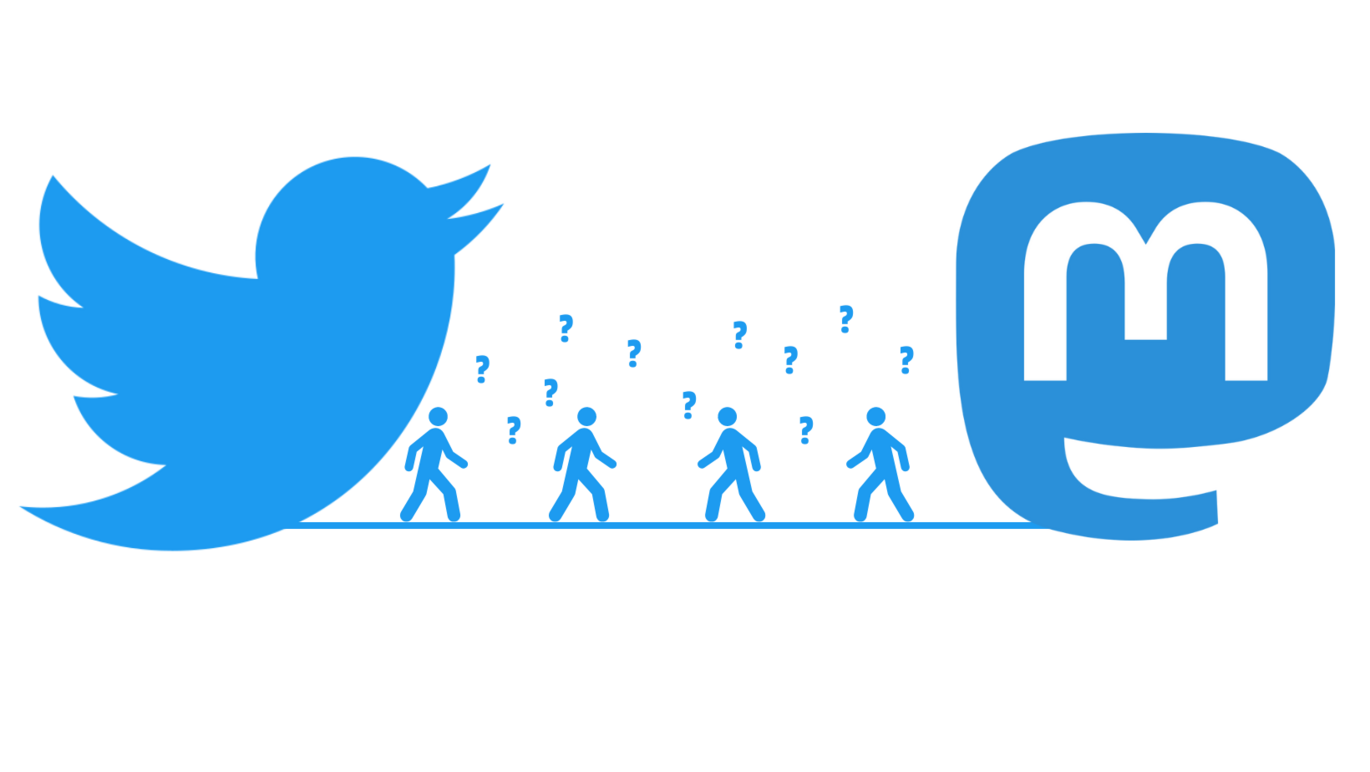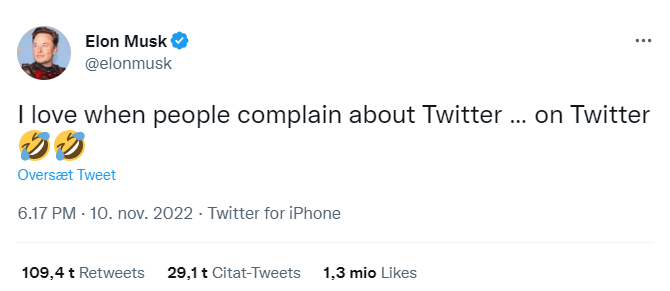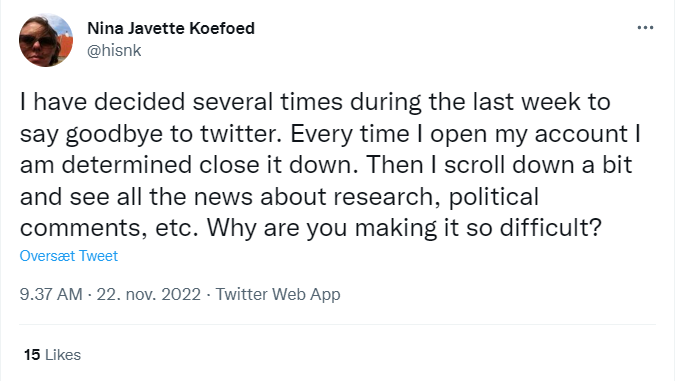Researchers in Twitter dilemma after Musk’s takeover: Should I stay or should I go?
Twitter is popular among researchers, but with Elon Musk’s takeover, many are now asking whether they should stay or migrate from the social media platform. Media researcher at AU Jesper Tække believes that Elon Musk has underestimated what it takes to run Twitter but that researchers with several followers will cut the platform some slack. The researcher behind the profile AUforsker, Lone Koefoed Hansen, thinks it’s too early to tell.

As well as providing a platform for debate, communication, information sharing and public streams of consciousness, Twitter is known for being a place where people can follow the news as it unfolds, sometimes minute by minute. Since Elon Musk acquired the social media mega-giant in October for USD 44 billion – DKK 330 billion – and took over its management, Twitter has itself become the news that people can follow from the front row.
In just over a month, Elon Musk has got rid of about half of Twitter’s employees – including many who were responsible for moderating its content. He has also asked staff to resign if they are not prepared to be “extremely hardcore” and to work “long hours at high intensity”. At first, he introduced a monthly subscription fee of USD 8 (DKK 60) for the blue tick that shows an account has been verified, but he quickly removed this when he discovered that anyone could pay to verify an account and impersonate anyone they wished. He has brought back previously suspended accounts belonging to prominent names such as the former American president Donald Trump, psychologist Jordan Peterson and the artist Kayne West. And Musk himself is pretty active on the platform, issuing tweets several times a day. On 10 November, for example, he wrote: “I love it when people complain about Twitter ... on Twitter”.
But Twitter’s new owner, who calls himself a free speech absolutist, has caused many Twitter users to reconsider their future on the platform. The social media platform Mastodon, perhaps the closest thing to Twitter, has gained over a million new profiles since 27 October.
And AU researchers are also considering their Twitter options. One of them is Associate Professor Lone Koefoed Hansen, who conducts research into digital aesthetics and design, and who is uncertain what the future will bring for Twitter. Lone has a personal Twitter profile but is also behind the AUforsker profile, which has almost 5,000 followers and which gives different AU researchers a platform to communicate their research every week.
“I’m going to keep an eye on how the situation develops. Whether it becomes an annoying place to be. Because, if Twitter goes off the rails, I don’t think the AUforsker profile is worth maintaining. But as long as it continues to go well, I’ll stick with it.”
“I’ll keep track of whether the interaction stays the same. Whether there is anyone left, and who is left. I’m hedging my bets, you might say. This isn’t because I’m waiting for a more opportune moment to move or close the accounts, but more because I can’t help wondering: What will the situation look like in a week’s time?” says Lone Koefoed Hansen.
Lone Koefoed Hansen: If the good users go elsewhere, we’ll also close our account.
Lone Koefoed Hansen explains that she will keep an eye on two things. The first is whether Twitter can actually keep functioning or whether it will fall apart as a result of staff shortages – because employees are leaving and Musk doesn’t have enough people to maintain the platform. In this case, it goes without saying that many users will disappear or move to another platform like Mastodon. The second is how many users will turn their back on Twitter because they fear or experience that the tone of the debate is suffering as a result of reduced moderation.
“This is the value-based, ethical and moral aspect. Is it worth staying on a platform if it develops into a bad place to be? If this happens, I think I will close both my personal account and the AUforsker account. We’ll just say “Thanks for a fun ten years” (the profile was set-up in 2013, ed.) and we’ll go somewhere else.”
“Purely in terms of our user group, there have to be people who are interesting to talk to and have a conversation with. If nobody is worth talking to, because all the good users have moved on, we will also close our account. We’ll call it a day. It takes quite a bit of work to keep an account like this running – work for me and for others, because we have weekly hosts,” says Lone Koefoed Hansen.
Social media researcher: Musk has underestimated the task
Associate Professor Jesper Tække conducts research into social media and believes that Elon Musk, who is also behind the electric car giant Tesla and the space exploration company SpaceX, has underestimated the task of running Twitter.
“It seems as if he just went in expecting that everyone would say: Okay, I can handle it. I think Musk thought it would be easy to run Twitter. Just as it was easy to make electric cars or send satellites into the atmosphere. But social media is extremely complex, and in a different way than temperature, gravity and battery durability. The social media space is not a trivial system. He must have completely misjudged this,” says Jesper Tække.
According to Jesper Tække, Musk’s countless tweets and interventions in his first month as the owner of Twitter reveal what has always been the case: that social media is in private hands.
“There is a complete lack of independence, and perhaps this is helping to make it clear for us that it is problematic when private individuals can suddenly control public debate: who is allowed to speak and what they are allowed to say. This has always been a problem. The commercialisation of our communicative infrastructure is algorithmically controlled in a way that makes it very difficult to know how we actually get to use our voice,” says Jesper Tække.
Even so, the media researcher has a suspicion that Twitter will live on and that, after a chaotic first month under Musk, it will eventually return to normal. This is not least because Twitter is such a powerful tool for communication, he explains.
“I think we need to remain calm and see what happens. I imagine that Twitter will get up and running again. It will survive, unless Musk decides to close it down. Even if he tries to sell it on. After all, the value of Twitter lies in its users,” he says.
A public space
Like Jesper Tække, Lone Koefoed Hansen believes that Twitter users are now even more aware that a public space such as Twitter is in private hands. She views this private ownership as problematic, because it means that only a few individuals get to determine the ground rules.
“I think it’s a problem and that it always has been – just like with Facebook and the others. Because we have a public space that is not actually public.”
“There are many things we could criticise this type of platform for, but this doesn’t mean I think the platform shouldn’t exist. It just exists on certain terms, and this has become very clear with the recent acquisition of Twitter. Many people are now thinking: Hey, wait a minute. What we thought we could take for granted and was for everyone actually is not,” she says.
An alternative to Twitter
Many researchers – including AU researchers – have already made the move over to Mastodon, which until a few weeks ago was an unknown social media platform for many.
Mastodon is more complicated and more difficult to navigate than Twitter. It consists of different servers, each of which is a kind of community with its own owner who sets the rules. As a result, several people can be on Mastodon without ever encountering each other because they are on different servers. This decentralised concept also means that there aren’t any employees running Mastodon. The platform is run by the owners of the servers. Mastodon’s founder Stifteren Eugen Rochko has himself called it a democratic alternative to Twitter.
Professor of political science Michael Bang Petersen is probably the AU researcher with the most followers on Twitter – over 33,000. Although he is still active on Twitter, he has also created a Mastodon profile. Because, as he tells Politiken: “Then you can always move over there”.
The current trend to create a new account elsewhere is encapsulated by a recent online conversation between AU employees:
Associate professor of history Nina Javette Koefoed has over 1,200 Twitter followers and, on Tuesday 22 November, she wrote that she had considered closing her account several times that week but could not bring herself to do so.
“I have decided several times during the last week to say goodbye to twitter. Every time I open my account I am determined to close it down. Then I scroll down a bit and see all the news about research, political comments, etc. Why are you making it so difficult?”
“Come over to Mastodon”, tweeted joint union representative Olav W. Bertelsen, while dean of Arts Jonny Laursen wrote: “Hang in there!”
AUforsker not making the move to Mastodon
Many people are creating Mastodon accounts while they wait and see what will happen to Twitter, explains Lone Koefoed Hansen.
“They want to have somewhere they can land if everything breaks down tomorrow. This is definitely the motivation I can recognise among researchers on Twitter at the moment,” she says.
The AUforsker profile probably won’t make the move over to Mastodon just yet, explains Lone Koefoed Hansen, who has nevertheless created an account for herself just in case, though she doesn’t use it frequently.
“I think that, in many ways, Mastodon can do a lot of the things Twitter can, but it’s still a slightly different thing. If everyone on Twitter were suddenly on Mastodon, I could imagine having an AUforsker account on Mastodon. But I don’t think the account will change platforms.”
"I have a feeling that AUforsker belongs on Twitter, and that it will stay on Twitter for as long as it makes sense to do so,” says Lone Koefoed Hansen.
Social media researcher: Mastodon is a dead end
While Mastodon has recently passed the two million active users a month mark, Twitter has over 200 million active users every day. Media researcher Jesper Tække doesn’t think that Mastodon will get the chance to become the new Twitter. He calls it a “dead end”.
“It seems far too complicated and difficult. There are different servers, and it’s difficult to export your Twitter network and implement it there. And those people you usually follow or are followed by have to be on the same server as you. It’s really an uphill struggle,” says Jesper Tække.
The researchers who have worked hard to build up a large following will simply have too much to lose.
“Those users who have been on Twitter for several years and who have made Twitter part of their daily lives will probably not emigrate from the platform in large numbers. The loss for them will be too big. It is on Twitter they have their network and a communication infrastructure they are used to navigating – and where there is transparency in relation to whom they would like to follow. And they know whom they would like to read what they write. If you lose that, you lose something valuable, says Jesper Tække, who suspects that, despite the recent critical tone, many people will cut Twitter some slack:
“For this reason, I think people will show a lot of tolerance and patience. And perhaps much of the current criticism is just noise, because people are frustrated and unhappy with the situation. But it’s a bit like being frustrated with your parents. What can you do about it?






